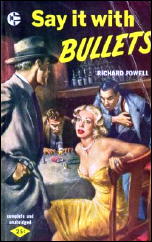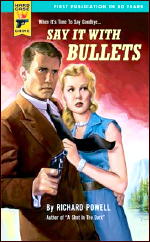Sat 21 Jul 2012
Reviewed by Dan Stumpf: RICHARD POWELL – Say It With Bullets.
Posted by Steve under Reviews[4] Comments

RICHARD POWELL – Say It With Bullets. Simon & Schuster, hardcover, 1953. Graphic Books #93, paperback, 1954; hard Case Crime, paperback, 2006.
The fine cover of the Graphic edition of Say It With Bullets appears to be simply a stock image pulled from their files and slapped on at random, because it does’t depict any of the characters or situations in Richard Powell’s fast-paced story.
In fact, it doesn’t even convey the mood of the piece, which is an outdoorsy, scenic kind of thing about a guy on a guided bus tour of the West trying to find the guy who’s trying to kill him.
Just by way of background, sometime before our story started, Bill Wayne, the hero of the piece, was a flier for Nationalist China. When all that went South, he and his partners started air-ferrying refugees to safety in Hong Kong.
Then his partners (there were five of them) decided they’d rather fly stolen gold off the mainland, Bill objected, someone shot him in the back and all of them left him for dead. Now, as the book starts up, Wayne is back in the states, tracking his old “buddies” down and —
— and here’s where things get a little off-beat, because Bill has elected to join a package bus tour that will swing through the cities where his erstwhile partners live. The pretty young tour guide takes what is known as a shine to him, and Bill realizes out he’s being stalked himself. (But by who? we wonder as the plot coagulates.)

When Bill finally confronts the first of his ex-partners, he discovers he’s not the kind of guy who can shoot a man in cold blood, but that doesn’t matter much because it turns out whoever’s following Bill is more than happy to kill his old buddies and leave a trail of incriminating evidence right back to our hapless hero.
Say It With Bullets is what I call a Bimbo Book: not much for brains, but easy to get along with. The action is fast and formulaic, the characters clichéd and lively (particularly a humorous cowboy deputy, who runs deeper than he looks) and the writing surprisingly sharp for a dumb book.
The repartee is genuinely witty, and Powell evokes the contemporary West (well, contemporary in 1953) with a writer’s eye for detail. There’s a nice bit where hero and heroine take a short cut on a back road that runs between Nevada and Yosemite National Park; I’ve driven this road myself, and it’s like riding a kicking jackass for three hours.
Powell evokes the experience with writing that brought back every sharp turn and pitching slope — pretty good for a book that is basically the literary equivalent of a dumb blonde.
July 21st, 2012 at 2:22 pm
You don’t usually get a chance to do this with old vintage paperbacks, but SAY IT WITH BULLETS was reprinted by Hard Case Crime not too long ago, and it’s fun to read what readers on Amazon are saying about it.
Overall I’d say they agree with you, Dan. The book’s overall rating is 4 stars, out of 5, which is not bad, with nobody giving it less than three. Comments range from:
“Richard Powell’s SAY IT WITH BULLETS is not only gripping, and entertaining, but the author has a sense of humor that just doesn’t quit.”
to:
“Sometimes books are out of print for a reason.”
But the latter still gave the book three stars.
July 22nd, 2012 at 1:10 pm
I agree with the review as far as I have read the book. A year ago I began to read this novel, but did not finish it. It did not seem to be very exciting or excellent. But I liked the humour. One day I will finish the book.
July 27th, 2012 at 12:57 pm
Richard Powell is another underrated writer. SAY IT WITH BULLETS displays many of his strengths: good plotting, suspenseful action, and a sense of humor.
July 27th, 2012 at 4:48 pm
Underrated, and almost forgotten, which is why this book is such a good candidate for this week’s list of “Friday’s Forgotten Books” on Patti Abbott’s blog.
http://pattinase.blogspot.com/2012/07/the-summing-up-friday-july-27-2012.html
For more about Powell, who died in 1999, there’s a long interview with his daughter here: http://www.bookthink.com/0097/97pro1.htm
She’s doing a good job of keeping him in print, but George, you’re right. He’s still underrated.